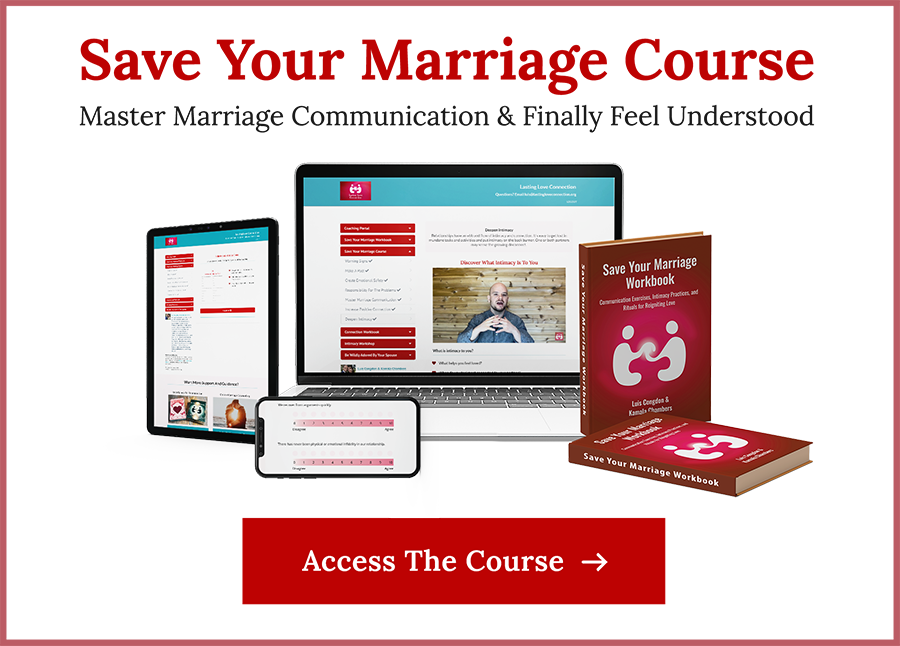Learning how to set boundaries in a relationship can feel intimidating.
It’s normal to feel hesitant about setting boundaries, especially if it’s something you’re just starting to explore.
However, healthy boundaries are an essential part of a thriving partnership.
In this article, you’ll learn about how to establish boundaries in a relationship, what healthy and unhealthy boundaries look like, and tips for setting healthy boundaries in your relationship.
Table of Contents
Why do you need to know how to set boundaries in a relationship?

Boundaries help you create a healthy relationship.
One way to think about boundaries in relationships is ‘where one person ends, and the other begins.’
When you set relationship boundaries, you acknowledge that you and your partner are separate individual beings with your:
- Own thoughts.
- Own feelings.
- Own needs.
- Own problems.
- Own identity.
Boundaries are the personal limits you establish to prioritize your well-being and the health of the relationship.
Examples of healthy boundaries in relationships include requesting alone time or telling your partner the types of physical touch you like and don’t like.
Setting boundaries allows you to grow closer as you share what you need and expect from each other.
Setting healthy boundaries in a relationship helps you

- Establish mutual respect and understanding.
- Gain insight into each other’s values, feelings, and needs.
- Create clear expectations of each other.
- Reduce unnecessary conflict and frustration.
- Deepen emotional safety and trust.
- Improve your mental health and well-being, so you can be at your best.
Additionally, setting boundaries ensures you and your partner are on the same page about what’s okay and what’s not okay in your relationship.
Removing the need to guess or assume makes relationships feel safer.
Many people mistakenly believe that when you set boundaries, you shut down connection.
However, if done right, boundaries pave the way for deeper connection, emotional intimacy, and trust.
The difference between healthy and unhealthy boundaries
When there are healthy relationship boundaries, it deepens trust and understanding between you.
Examples of healthy boundaries

- Respecting each other’s values and opinions, even when they differ.
- Having the freedom to ‘say no.’
- Agreeing on the kind of behavior and language that is appropriate/inappropriate during conflict.
- Taking ownership of your feelings.
- Maintaining a healthy balance of time together and apart.
- Pursuing individual interests and activities outside of the relationship.
On the other hand, unhealthy boundaries are often a lack of boundaries.
Also, an unhealthy boundary can arise when limitations are not clearly defined or respected.
Often, unhealthy boundaries result from conflict, broken trust, toxic patterns, or unhealthy relationship dynamics.
Examples of unhealthy relationship boundaries

- Attempting to ‘fix’ or ‘save’ your partner.
- Taking responsibility for your partner’s emotions.
- Compromising your beliefs to please your partner.
- Accepting disrespectful or abusive behavior.
- Disregarding your partner’s right to privacy or personal space.
- Feeling like you can’t have a life outside of the relationship.
Also, boundaries in other areas of life can affect the quality of your relationship.
For instance, if you have blurred work-life boundaries, you may check your e-mails during dinner instead of being present with your partner.
Setting personal boundaries around work, family, and other areas of life can, in turn, improve your relationship.
What are signs of poor boundaries in a relationship?
There are various ways that poor boundaries manifest in intimate relationships.
Signs of poor boundaries in a romantic relationship

- Disrespecting each other’s opinions or feelings.
- Difficulty communicating honestly.
- Tolerating hurtful behavior.
- Emotional exhaustion from trying to meet unrealistic demands.
- Going along with whatever the other person wants.
- Losing your individuality or sense of self.
- Feelings of resentment.
When there are poor boundaries, it leads to unhealthy dynamics and relationship problems.
For example, your partner may expect you to respond to their text messages immediately to assuage their anxiety. This expectation leads you to feel overwhelmed and controlled.
Without boundaries, this pattern of codependency continues, negatively impacting you and the relationship.
Many toxic relationships share common traits, such as a lack of clear boundaries or refusal to respect the communicated boundaries.
Boundaries are essential for healthy relationships
When discussing boundaries with your partner, consider the following areas:
- Physical boundaries.
- Emotional boundaries.
- Intellectual boundaries.
- Spiritual boundaries.
- Sexual boundaries.
Physical boundaries

Physical boundaries involve what you and your partner are comfortable with regarding physical touch and personal space.
How do you like to be touched, and how do you not want to be touched?
What types of physical affection are you okay with in public?
Setting healthy boundaries allows you to clearly understand what each other needs to feel safe and comfortable.
Emotional boundaries

Expecting our significant others to fulfill all of our emotional needs places an expectation on the relationship that it’s not meant to fill.
Emotional boundaries prevent you and your partner from falling into unhealthy patterns of codependency.
Instead of becoming too dependent on each other for emotional support or validation, you develop healthy ways of coping with negative emotions.
For example, you might set an emotional boundary by letting your partner know that you won’t be able to reply to their texts while you’re at work or with your friends, and they will need to find ways to self-soothe when you can’t get back to them right away.
Setting necessary boundaries is particularly important when you or your partner is living with a mental health condition.
While you can be there to listen to and support each other, you can’t solely carry the weight of each other’s struggles.
As a result, you may feel more like each other’s therapist than romantic partners.
Setting healthy boundaries might look like building your own support systems of friends, family members, and mental health professionals, like a clinical psychologist.
Intellectual boundaries

Intellectual boundaries involve respecting each other’s opinions, feelings, and beliefs, even when different.
Acknowledging that you and your partner are individuals with your own way of seeing the world allows you to express yourselves without fear of judgment or criticism.
Further, healthy boundaries allow you and your partner to pursue individual interests outside of the relationship.
Spiritual boundaries
Spiritual boundaries encompass your individual religious beliefs and value systems.
Without spiritual boundaries, you or your partner may feel compromised in your religious or moral convictions.
You may feel like your beliefs are not considered or respected within the relationship.
Sexual boundaries

Sexual boundaries help you to define mutual expectations for sex and intimacy.
These boundaries include what types of sexual activities you are comfortable with, what you do and don’t like during sex, how often sex occurs, and any limitations around physical intimacy.
Not everyone feels comfortable talking about sex. It can feel awkward or uncomfortable at first.
However, having these conversations allows you to voice your preferences and needs, which makes for more fulfilling sexual experiences.
Additionally, setting sexual boundaries establishes clear expectations, which increases trust and safety in your relationship.
When you establish an ongoing dialogue about sex, you’ll be able to address issues as they arise, such as lack of sex drive.
To get support around how to set boundaries in a relationship, a relationship coach and guide you.
We’re here to help.
Book a complimentary couples consultation and let’s chat about how we can help you and your partner set healthy boundaries in your relationship.
Set healthy boundaries about sex in a new relationship

Setting clear boundaries around sex is especially important at the beginning of a relationship.
Before becoming intimate with a romantic partner, initiate an open discussion around expectations and safety.
Some questions you can ask include:
- What does sex mean for the relationship moving forward?
- Do you have expectations about exclusivity?
- What contraceptive methods are you the most comfortable with?
- How can we minimize risks around sexually transmitted infections?
- What do you tend to like or not like when it comes to sex?
While discussing sexual boundaries may feel uncomfortable at first, it can ultimately enhance your sexual connection by:
- Creating a foundation of mutual respect and safety.
- Opening the lines of communication around sexual preferences, needs, and desires.
- Bringing you closer and deepening intimacy.
How to set boundaries and build healthy relationships
Setting boundaries can seem scary, particularly if you aren’t used to doing so.
However, there are some simple ways to start setting healthy boundaries in relationships.
Know what you want in a relationship

First, take some time for self-reflection.
Consider what is important to you within a romantic relationship.
How do you feel when interacting with your partner?
For example, do you feel heard, respected, and supported?
Do you wish you could feel more comfortable sharing your innermost thoughts and feelings?
Taking note of how you feel when things are going well and what you’d like more of in your relationship can give you an idea of where to start.
Additionally, take the time to reflect on past romantic relationships.
What worked for you in the past?
What didn’t work?
Were there any unhealthy patterns you are set on not repeating?
Reflecting on other relationships helps you more clearly define what you need in your current relationship.
Further, consider your values and long-term goals.
What is most important to you, and how can your relationship support you in achieving your dreams?
In what ways have past relationships stood in the way of your goals or caused you to compromise your values?
Taking the time to ask yourself these questions leads to greater insight into what you want and need in a relationship and the types of behaviors and patterns you will or won’t tolerate.
Set expectations with your partner

Next, it’s time to discuss boundaries with your partner.
Start the conversation by letting your partner know that you want to talk about ways to make sure you both feel safe and respected within the relationship.
Some healthy boundaries in relationships might look like:
- I need an hour to myself in the evenings to recharge.
- I’m glad you get together with your friends on Fridays. That being said, I would appreciate you texting me if you’re going to be out past midnight.
- I’m happy to work through issues calmly, but I will leave the room if there is yelling.
- I love joking around with you but prefer not to discuss this topic– it’s sensitive for me.
- I enjoy having our family members over. However, I need to know they’re coming at least an hour in advance.
When communicating your boundaries, focus on expressing your needs and concerns without judgment or blame.
Instead of zeroing in on what your partner is or isn’t doing, calmly express what you need moving forward. Try to be as specific as possible with your requests.
Then, encourage your partner to share their own boundaries or concerns.
Setting boundaries helps you and your partner work as a team to ensure you are getting your needs met and preserve your mental and emotional well-being within the relationship.
As you learn these skills, it can also flow into your other personal relationships, improving your connections with family members and friends.
Learn more about how to set healthy boundaries as a couple in the Save Your Marriage Course.

Anticipate resistance

Sometimes, your partner may hear your boundary and be immediately receptive to it.
However, in other cases, your partner may respond negatively.
They may make you feel guilty for setting a boundary or try to argue against it.
When you set boundaries, it may not be well-received.
Anytime you try to change the status quo, it might be challenged or met with resistance.
However, the goal of setting boundaries is not to please everyone.
Boundaries set the parameters that support your mental health and personal well-being and set the relationship up to succeed.
Allow room for your partner to express their feelings in response to your boundary, and at the same time, don’t sacrifice your needs to ‘keep the peace.’
Maintaining personal boundaries in relationships

While setting boundaries can be challenging, maintaining healthy boundaries is a whole different ball game.
There are many reasons why it can be difficult to maintain boundaries in relationships.
For instance, you may struggle with a lack of self-respect or low self-esteem, making it challenging to believe your needs are as important as others.
When your partner crosses your relationship boundary, you may make excuses or convince yourself that your requests don’t really matter.
In contrast, someone with high self-esteem is more likely to remain true to the boundaries they set, knowing their needs are valid and they aren’t ‘asking too much.’
Additionally, you might struggle to maintain healthy boundaries out of fear of conflict or abandonment, believing that your partner might leave you if you start to assert yourself or alter the relationship dynamic.
What if your partner doesn’t respect your boundaries?

Sometimes, your partner might accidentally cross your boundary without realizing it or meaning to.
Initiate an open discussion with your partner, reminding them of the boundary you set and why it’s important to you.
It may just be a matter of keeping an open line of communication about the requests you’ve set and checking in regularly.
However, your partner may repeatedly violate your boundaries and seem uninterested in changing their behavior.
Repeated boundary violations harm your connection by diminishing trust and safety in the relationship.
In that case, it may be worth seeking the support of a marriage coach to address boundary issues.
A marriage coach can help you set healthy boundaries.
A marriage coach or relationship coach can help you and your partner set and maintain relationship boundaries.
Marriage coaching gives you a safe space to express your needs and concerns so that you can strengthen your communication with each other.
We can teach you practical steps for boundary setting and guide you as you create healthy boundaries that improve your relationship.
Additionally, we can support you in addressing unhealthy patterns in your relationship that may be getting in the way of establishing and maintaining healthy boundaries.
Let’s chat! Book a complimentary couples consult.
Or, if you’re looking for a way to work through this on your own, pick up the Save Your Marriage Course.






0 Comments